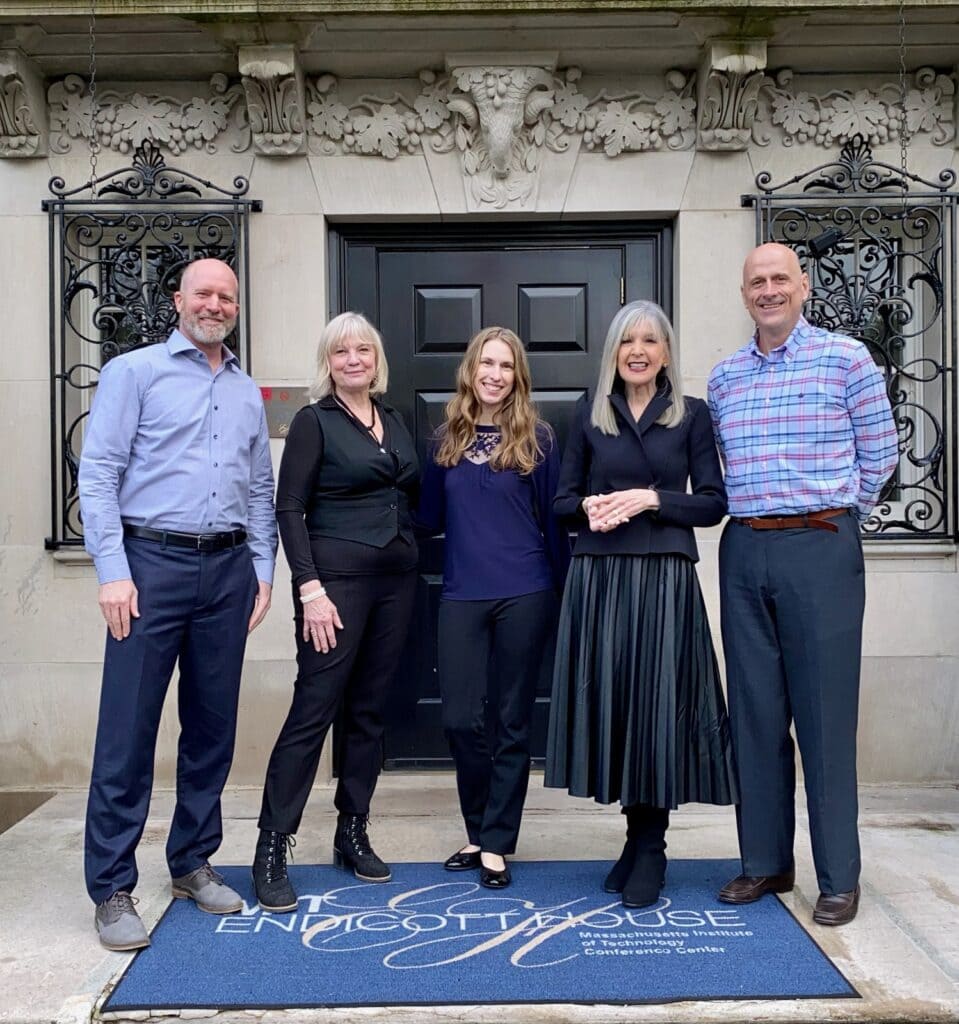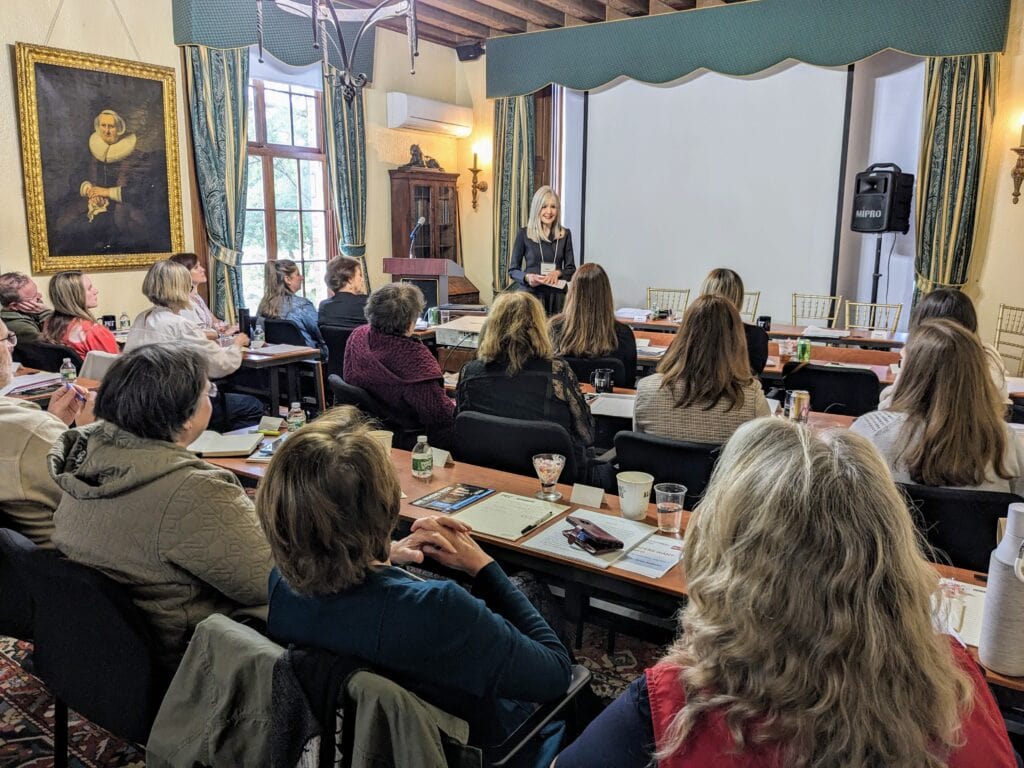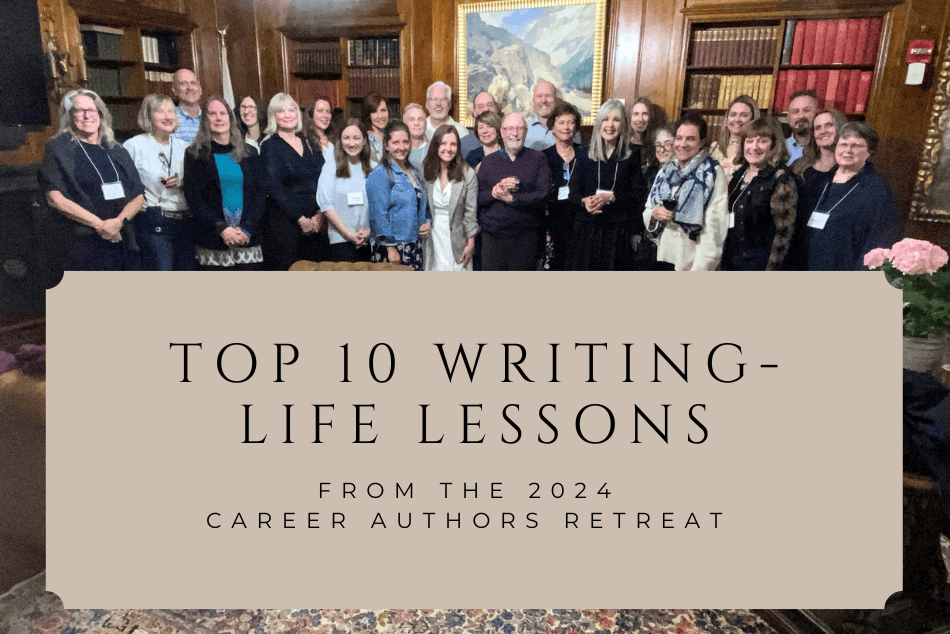Twenty-seven writers. One gorgeous, sprawling estate. A few dozen works-in-progress. Countless stories waiting to be written.
Our retreat has become an annual milestone for the five of us behind Career Authors, and for many of our repeat attendees, too: It deepens and strengthens our sense of community, serves as a benchmark for how far we’ve come, and inspires us to reach for new goals. We’re so grateful to everyone who joined us this year—your willingness to share your work, to enrich each workshop with your participation, and to stay open to feedback made this year our best yet.
Whether you’re reliving the weekend or hoping to live vicariously, here are 10 of our favorite takeaways from the 2024 Career Authors Retreat at MIT Endicott House.

-
We are never done learning.
As a part of the Career Authors team, it was humbling to look out from the podium of my session and see my colleagues nodding along, raising their hands, and scribbling notes. These are people who’ve been in the business for decades—but then again, I’d been doing the same when they were center stage!
It just goes to show: We’re never done taking in new ways of looking at the writing craft. We never reach a point where we’ve heard it all before, and you never know what might ignite new ideas. That’s magic.
If your writing has hit a rut, a retreat or workshop might be just the thing to wake up your creative mojo.
-
Project confidence in talking about your book.
“If someone asks you what your book is about, then you must be able to tell them in a clear, concise, and compelling way,” Brian Andrews says. “In theory it sounds so simple, but in reality it’s hard.” The key? Putting a lot of thought—and practice—into your pitch.
“A pitch is not what ‘happens in your book,’” Andrews explains. “A pitch is not “my character did this, and then did that, then went here, and oh I forgot to tell you about something else, which happened first…and yada yada yada. A pitch should have stakes. A pitch should have a hook. And most importantly, a pitch should roll off your tongue without you having to think about it.”
-
Need help with #9? A retreat can deliver that!
“I am profoundly affected by how many attendees leaped the chasm from ‘a maybe, sorta, perfectly good but unformed and amorphous idea for a story,’ to creating a strong, focused log line,” Hank Phillippi Ryan says. “One of the most difficult parts of writing a novel is distilling your idea to its essence, and then crafting the log line that will guide you to writing your entire book. Yes, they are difficult to write, but so many were developed over this weekend! And no one left on Sunday without understanding their critical importance, and how the right one can propel your ‘maybe it’s a book’ into a powerful reality.”

-
Even tentative titles matter.
Conventional wisdom may be that your book’s working title is just a placeholder… for now. But listening to dozens of writers discuss their projects aloud, there’s no denying that an irresistible title commanded the room’s attention immediately. Brainstorming new and improved titles as a group was a lot of fun… and perfectly illustrated why titles are important. The best ones not only turn heads (literally), but they’re instantly memorable, too.
-
The best writers read. A lot.
“Read widely in your genre and sub-genre,” Paula Munier says. “If you don’t, you’ll find positioning your book very hard to do. Stephen King says that for every book you write, you should read 100 books. To be able to position your book successfully against your competition, you should read 100 books in your own genre. Then you’ll really know what kind of reading experience fans of your genre are looking for—and how you can meet their expectations—to make your mark.”
-
It’s good to ask questions!
I often see writers in workshops raise their hands looking sheepish or timid—but there’s never any need to apologize for being there to learn. In fact, writers who ask smart, targeted questions make a stronger impression, because it’s evident that they have specific goals in mind, with a sense of what they still need to work on and a willingness to put in the time and effort to get it done.
Especially at intimate retreats like Endicott, faculty members make a point to follow up with those attendees who thoughtfully or bravely participated in our sessions’ Q&As (grabbing a seat next to you at a meal, for instance), because you’ve sparked our interest in your project and/or in you as a writer. It’s a good reminder: Whether you’re at a small retreat, a large workshop, or even a regional book festival, how much you walk away with is ultimately up to you.

-
Trust your readers.
Especially in your opening pages, redundancy and info-dumps are not your friends.
“A book is a pile of papers or digital data until someone comes along, reads it, interprets it, and brings its story alive,” Dana Isaacson says. “A key question is how much description to include. Clarity is a must for writers, but that doesn’t mean your prose must hand absolutely everything over to them. Instead, let readers participate in the story. … Guide readers through your story while at the same time allowing them to imagine, filling in the empty spaces themselves.”
-
Pay attention to point of view.
“If you want a seat at the publishing banquet, you must first master Point of View,” Andrews says. “Just like the door attendants at a black tie event will turn away party-crashers who show up in flip-flops and a tank top, agents and editors will turn down every aspiring author who hasn’t mastered POV. The harsh reality is this: authors who don’t understand and/or haven’t mastered POV might as well be wearing at name tag that says Amateur. It’s not a dig, just the truth. Even if your query is magnificent, and your pitch is perfect, and your concept is unique and compelling if the agent reading your submission finds POV cheats or confusion on the opening page, they will stop reading.”
-
Don’t send your work out too soon.
“This is the most common mistake new writers make,” Munier says. “You usually get only one chance with an agent or editor, so give it your best shot. Writing is rewriting–so polish, polish, polish before you start sending out your work.”
-
Everything is more fun with friends.
 At the end of the weekend, our attendees were organizing their own email lists so they could all stay in touch. Who wouldn’t want to hang onto all that newfound camaraderie and support? As the team running this event, we Career Authors know how important it is to set the tone—and I think it’s obvious to everyone how much we respect and admire one another as colleagues and as friends.
At the end of the weekend, our attendees were organizing their own email lists so they could all stay in touch. Who wouldn’t want to hang onto all that newfound camaraderie and support? As the team running this event, we Career Authors know how important it is to set the tone—and I think it’s obvious to everyone how much we respect and admire one another as colleagues and as friends.
We covered a lot of ground at the retreat and had a great time, too. Hank Phillippi Ryan taught a riveting suspense workshop, Brian Andrews tackled structure, I delved into authentic characters, Dana Isaacson covered editing, and Paula Munier gave brilliant guidance on discovering your book’s selling points. Every author received one-on-one consultation as well as a chance to workshop their opening pages and elevator pitches in a friendly, intimate setting. Every night, we broke for mingling over cocktails—and thanks to the world-class staff at Endicott House, we ate like kings and queens.
Every year is a little bit different, but the heart of this event remains the same—so we hope you’ll put it on your wish list to join us in 2025!





